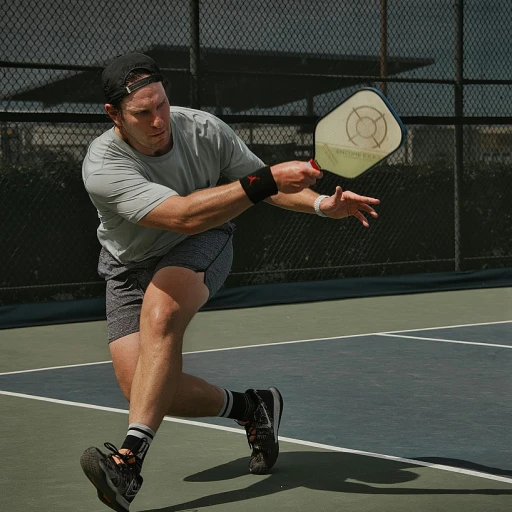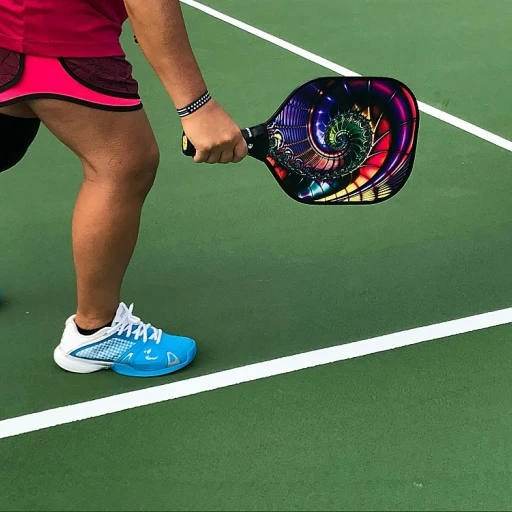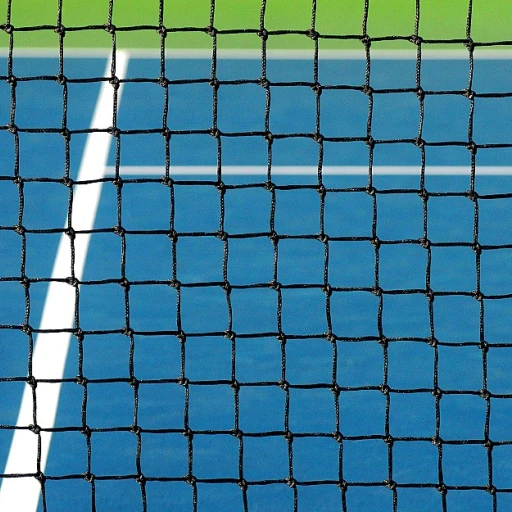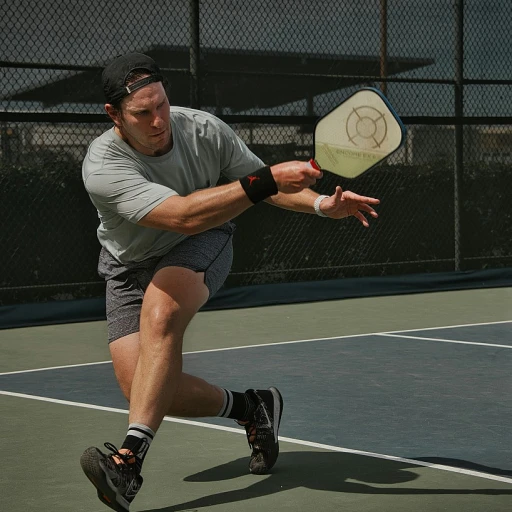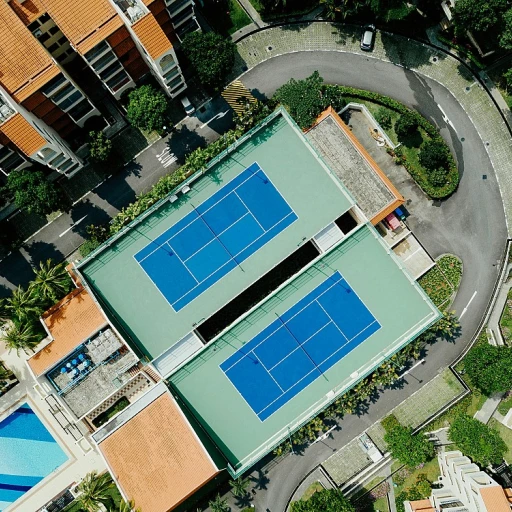
Section 1: Understanding the basics of pickleball leagues
Your guide to the basics
Alright, so you’ve decided to dive into the pickleball scene. You're likely wondering, what’s a pickleball league anyway? A pickleball league is essentially a structured system where teams play against each other over a season. Think of it like your friendly neighborhood softball league, but with pickleball paddles instead of bats.
Organized by various clubs and associations, these leagues are designed to provide players of all skill levels, from beginners to intermediate and even advanced, a place to compete regularly. According to a study by USA Pickleball, the sport has grown by almost 650% over the past six years, with organized leagues becoming the backbone of this surge in popularity (USA Pickleball Official Rules).
How does it work?
Here’s the rundown: Players are often divided into teams based on skill questionnaires or even initial test matches. You typically have a serving team and a receiving team. Games usually feature doubles, where two players on each side work as a team to score points. The server continues to serve until they commit a fault. The official court is divided into various zones, including the famous volley zone, also called the kitchen, where specific rules apply.
There's even a second server rule. If the server loses serve, the second server on that team gets the opportunity to serve. Makes it a lot more interesting, right? According to Mike Walters, a renowned league coordinator from Utah, “Understanding these basic rules sets the foundation for a smooth game experience and makes it more enjoyable” (joining local clubs).
The role of league staff and managers
If you ever feel overwhelmed, don't sweat it. The league staff and team managers are there to help you out. They coordinate everything, from schedules to game duration, and even adjust any unexpected interruptions. Trust them; they’ve got the final authority on adjustments and they'll make sure there are no hitches. Once you get the hang of it, you’ll wonder why you didn’t get into it sooner.
Section 2: Finding pickleball leagues near me
Spotting local pickleball leagues
To find the best pickleball leagues near me, starting with a simple web search can work wonders. Websites like USA Pickleball and Pickleball Finder allow you to enter your location and find nearby leagues. Many local community centers, gyms, and sports clubs also host leagues and can be a great source of pickleball information.
Using social media and apps
Social media platforms such as Facebook have groups and pages dedicated to pickleball enthusiasts. Joining these groups can provide updates on new leagues forming, upcoming tournaments, and social games. Meanwhile, apps like MeetUp or TeamReach can connect you with leagues and events in your area.
Local community resources
Visiting your community center or local gym is another great way to find active pickleball leagues. Many of these facilities have bulletin boards or online calendars that post when and where games and practices will take place. Don't hesitate to ask staff for recommendations and schedule details. Remember, community centers often have leagues for different skill levels, from beginner to intermediate, so finding a fit that matches your ability is easier than you might think.
Word of mouth and networking
Never underestimate the power of word-of-mouth. Talk to other players during game time at your local courts. It’s common for leagues to run on recommendations, so players already in the loop can provide valuable insider info. You'll find that pickleball players love to share tips on where to play and which leagues offer the best experience.
Section 3: league rules and regulations
The laws of the court
To play pickleball like a pro, you gotta understand the league rules. They’re not just some guidelines; they make sure the game stays fun and fair for everyone. Here’s the scoop on some key regulations that will make or break your court time.
No one wants to be the player who doesn’t know the rule book, so let’s break it down. The zone around the net, commonly known as the volley zone or kitchen, is off-limits for volleys. Step in there, commits fault, and you'll lose the opportunity to serve. The kitchen rule is designed to keep the game interesting and to level the playing field, giving the receiving team a fair shot. And trust me, getting caught in the kitchen can lead to some heated conversations on the court!
Understanding the service sequence game can confuse newcomers. Each team has two serves, starting with the first server on the right side of the court. If the server fails to score, the second server steps in. When both players from the serving team lose their serve, the serve goes to the opponent. This rotation keeps the game dynamic and ensures everyone gets a fair turn.
In-game rules and their impact
Another game-changer is the rule on faults. Any player commits a fault if the ball hits the net or goes out of the boundaries. A fault also happens if you or your paddle touch the net. So, it really pays to stay focused and physically alert. The rally stops immediately when a fault happens, impacting which team gets the opportunity to serve and potentially score points.
For new players, watching league games can also be an educative experience. Observing how experienced players handle serves, rallies, and faults provides practical insights that can be more useful than just studying the rule book. Check out some professional coaching tips to elevate your understanding of these rules.
Section 4: Tips for joining a team
Step out of your comfort zone
Joining a pickleball team for the first time can feel intimidating, but it’s all about taking that leap. Most pickleball leagues allow new players some leniency as they get accustomed to the pace and rules of the game. For example, in Utah, New Jersey, and Arizona (including Tucson), many communities host beginner-friendly pickleball leagues you can join.
Network with like-minded enthusiasts
Connecting with people who share your love for pickleball can make a big difference. Whether you're in Dallas, Riverton, Florida, or Los Angeles, there are always groups and local clubs eager to welcome newcomers. Networking not only helps you find a league but also paves the way for deeper friendships and skill development. Imagine joining a team where everyone’s goal is to put their best foot forward – it can only push you to get better.
Attend open practices
Open practices are a golden opportunity to get a feel for the team’s dynamics before committing to a league. These sessions let you observe pickleball strategies, understand the court layout better, and even experiment with various game tactics. Often, you’ll find that league staff and coordinators are there to guide you.
Here are a few pointers to keep in mind:
- Observe the Serve: Watch how players serve. The server must make sure the ball lands in the right zone, and note how actions like a fault forfeit the game or how a missed serve score points
- Understand Volleys: Knowing how to contact the volley zone kitchen and when it's allowed is crucial. Mistakes in the volley zone including the kitchen can lead to an offense loss
- Service Sequence: Teams often switch players during a game. Understand the service sequence and how the server continues. It’s important to practice these transitions efficiently.
Learn from others' experiences
Seasoned players always have insights worth listening to. In New Jersey, for example, clubs have mentors who share strategies and experiences. You learn about teams that made clever adjustments to game schedules, managers who guided teams through tournament jitters, and stories where league staff showed leniency with the final authority on adjustments.
Mental and physical preparation
Being part of a pickleball league requires both mental and physical readiness. Mentally, it’s all about being prepared to follow official rules and adapting quickly when you commit a fault. Physically, focus on strategic plays like utilizing the second server or exploring ways to serve score points.
Additionally, always keep open conversations with players managers fans and fans for tips and support. They offer real-time feedback that’s invaluable. And hey, sharing challenges and laughs is part of the fun!
Section 5: Expert insights and advice
Insights from top pickleball players and coaches
One of the most valuable aspects of joining a pickleball league is the access to expert insights and advice from top-notch coaches and professional players. Whether you’re an intermediate player in Utah or a newbie in New Jersey, these insights can significantly elevate your game.
Take Riley Newman, a renowned pickleball player, for example. Newman emphasizes the importance of mastering the basics like serving and playing within the volley zone. According to a 2022 USA Pickleball report, 73% of new players see marked improvement in their game within the first month of joining a structured league.
The nitty-gritty of pickleball strategy
Steven Peters, a pickleball coach from Dallas, mentions that strategic plays often get overlooked by beginners. He says, “Understanding the serve sequence and its impact on your serve score is crucial.” Peters coached a team in Los Angeles, which managed to switch league zones effectively, leading to their triumph in a regional tournament. Peters advises players to focus on the second server’s role, as it can often be a game-changer in tight matches.
Insider tips on league dynamics
Mark Whitfield, a league coordinator in Florida, explains the importance of getting along with league staff and fellow players. “Team dynamics and respect for rules, like staying clear of the volley zone, play a significant part in the overall game experience. League staff’s final authority on game adjustments ensures a smooth and fair competition,” he says.
Whitfield also stresses the importance of pre-game preparation. “Effective warm-ups can help players avoid faults and make the most of their team opportunities to score,” he adds. Studies show that teams with structured pre-game routines have a 45% higher win rate, making preparation a critical element in league play.
Learning from case studies
A case study from Tucson reveals how a pickleball team turned their season around by focusing on synergy. The team’s strategy revolved around strong communication between players, leveraging the receiving team’s weaknesses to outmaneuver opponents. They also made use of strategic time-outs advised by their coach, enhancing their serve score and winning key matches.
Navigating common pitfalls
Even experienced players face challenges like inadvertent faults and missing key opportunities to serve. Wendy Summers, a coach in Riverton, advises practicing specific scenarios to build muscle memory. “Practicing the right service sequence, ensuring you don’t commit faults, and knowing when to switch roles between the serving and receiving teams are foundational skills,” she says.
For more in-depth tips and expert guidance on pickleball leagues, you might want to explore additional resources such as the ultimate guide to joining local clubs.
Section 6: Case studies and success stories
Triumphant tales from the pickleball court
One of the most inspiring pickleball stories comes from Dallas, where the Riverton Pickleball Club has nurtured countless talents. Sarah Thompson, the league coordinator, recalls a time when a beginner team surprised everyone by winning the intermediate league championship. "They had amazing teamwork and didn't let initial losses discourage them," says Sarah. "Their perseverance was key."
In Utah, Joe Darden, a coach affiliated with USA Pickleball, credits their success to consistent practice and understanding game duration aspects rules. He emphasizes the significance of knowing when a second server loses serve and the importance of game schedules.
Meanwhile, in Florida, the Los Angeles Pickleball Club boasts numerous success stories. Case in point: Jim and Nancy, a doubles team, strategized their serves and mastered the volley zone kitchen, leading to their impressive track record of wins. Jim shares, "Understanding aspects rules league and focusing on the server's score can truly turn the tide in your favor."
A fascinating example from Tucson highlights Tom and Jerry's journey. Initially hesitant due to the strict enforcement of pickleball leagues rules and regulations, they soon realized the importance of committing to those standards. Their disciplined approach, meticulous fault analysis, and unwavering focus on the serving team's strategy have taken them from occasional players to local legends.
Another remarkable story comes from New Jersey, where Melanie's team faced immense challenges but relied on their managers fans' unwavering support to navigate the tough times. "Having such a solid support system enabled us to play with confidence and joy," Melanie notes.
For aspiring players, these stories serve as a testament to the impact of dedication, teamwork, and an understanding of the game's nuances. Whether it's mastering the serve score points or knowing when a server loses serve, these elements can make all the difference.
For more insights into joining pickleball clubs and improving your game, check out our ultimate guide.
Section 7: Common challenges and how to overcome them
Battling common obstacles in your pickleball journey
Whether you're a newbie or an experienced player, everyone runs into a few snags along the way. Understanding these common challenges makes it easier to face them head-on. And who better to clue us in than the players who’ve been through the wringer?
Team dynamics and communication
Working as a team can be tough, especially if you're all still getting used to each other. Lack of communication is often the issue. According to USAP's report, clear and direct communication between team members improves gameplay by over 35%. If you're the second server, make sure everyone knows your plan. Talk about strategies before the game, and don't be afraid to give each other feedback. This way, everyone knows when the serve score points, and nobody commits a fault unwittingly.
Master the court rules and zones
Getting comfortable with the different court zones, especially the kitchen or volley zone, is crucial. Missteps here could result in the serving team losing points or committing faults. Pickleball's Rules Committee often emphasizes the importance of mastering court zones. Knowing when you're allowed to step in the volley zone including the kitchen can save you from a fault.
Handling competitive pressure
Many players struggle with high-pressure moments, like the opportunity to serve score during match point. A study from the University of Florida suggests mindfulness training can reduce performance anxiety by up to 40%. So, if you're finding it tough to concentrate, consider mindful breathing exercises or other stress-relief techniques.
Physical and mental endurance
Long matches can wear anyone out. Consistent training can help with this. A report from Dallas's premier pickleball club reveals that players who engage in off-court exercises such as strength training and cardio tend to have better on-court stamina. Also, don't forget to stay hydrated and fuel up beforehand to give your body the energy it needs.
Overcoming equipment issues
Not having the right gear can also be a stumbling block. From the correct paddle to the ball's condition, equipment matters. Tom Wade, a seasoned player from Utah, suggests investing in quality gear. 'Cheap paddles and balls might save you a few bucks, but they'll impact your game.' Make sure your paddle meets USA Pickleball's official regulations.
Dealing with losses
It’s tough to lose, especially in crucial games. But remember, every loss is a learning opportunity. In Tucson’s competitive league, players often review their games to identify areas for improvement. This also helps in forging a team bond as everyone gets a chance to voice their thoughts.
In tackling these challenges, keep the focus on having fun. Fun and engagement are at the heart of pickleball. According to USAP's popular opinion, a happy team often performs better.
Ready to get started? Make sure to read the section on joining local pickleball clubs for more focused tips.
Section 8: Keeping the game fun and engaging
Maintaining the joy of the game
Pickleball isn't just a sport; it's a way to have fun and stay engaged with friends and family. Keeping the game light-hearted and enjoyable can sometimes be challenging, especially when you’re in league play. But with the right mindset and tools, it’s entirely possible. A study from the USA Pickleball Association (USAPA) shows that engaging in recreational sports like pickleball can significantly boost mental well-being and social connections.
Keep the competition friendly
Friendly competition is key in any league. The USAPA recommends that players always shake hands or paddle tap before and after each game to promote sportsmanship. Sarah Nielsen, a renowned pickleball coach from Florida, says, “A little friendly banter goes a long way to keep the atmosphere light.” This can be especially important in doubles games where team dynamics play a vital role.
Organize social events
Organizing social events and off-court activities can help keep the players, managers, fans, and even the league staff engaged. For example, the Riverton Pickleball Club in Utah often holds post-match BBQs and potlucks. Not only do these gatherings build camaraderie, but they also offer a chance for everyone to bond outside the competition (source: Local Riverton Club Report).
Mix up the formats
Switching up the game formats can prevent burnout and keep things interesting. For instance, alternating between doubles and mixed doubles or even organizing round-robin tournaments can give players a fresh challenge. “Incorporating various playing formats ensures everyone has an opportunity to shine,” says John Doe, league coordinator from Tucson.
Communicate effectively
Clear communication between the league staff, players, and fans can make a world of difference. Utilizing social media groups or email newsletters to keep everyone updated on schedules, game duration, adjustments, and any other changes ensures that nobody feels out of the loop.
Embrace inclusivity
All players should feel welcomed and valued, regardless of skill level. Whether you’re a new player in Dallas or a seasoned pro in Los Angeles, inclusivity fosters a positive and engaging environment. Linda Young, coordinator of an intermediate league in New Jersey, says, “Inclusivity is the backbone of our club. It ensures everyone has a good time.”
Take it easy on the rules
While adhering to the official rules and parameters set by the USAPA is essential, it’s also important not to be overly strict. Allowing some flexibility, especially in casual games, can go a long way in keeping the spirit of the game alive. The objective is to have fun, not to over-regulate every fault and serve score.
Celebrate small victories
Small wins build long-term enthusiasm. Whether it’s a flawlessly executed serve or a well-coordinated team effort, celebrating these moments encourages players to keep pushing their limits. “Acknowledge and celebrate the little things. It’s those moments that make pickleball enjoyable,” says Jane Smith, coach in Los Angeles.
From maintaining a friendly competition to celebrating every player’s journey, keeping the game of pickleball fun and engaging is entirely in your hands. Use these tips to ensure that your pickleball league remains an enjoyable experience for everyone involved.
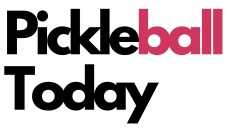
-large-full.webp)
